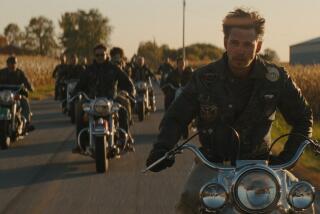Review: HBO’s ‘Vinyl’ has lots of sex and drugs but is light on rock ‘n’ roll
Martin Scorsese, the film director, and Mick Jagger, the rock star, along with “Boardwalk Empire” creator Terence Winter and journalist-screenwriter Rich Cohen, make up the formidable force behind “Vinyl,” a new HBO series about the music business set in New York in the early 1970s. For better or worse, it might be described as exactly the sum of their parts, with some other parts mixed in.
It is 1973, and Richie Finestra (Bobby Cannavale) is about to sell his troubled record label, American Century, to a corporate behemoth. (There are straight-laced Germans, comically portrayed. They call Led Zeppelin “The Led Zeppelins.”) Unforeseen complications involving the aforementioned Led Zeppelins send him into a drug-fueled downward spiral, which turns into a kind of upward spiral, which then sort of falls over on its side in a pile of cocaine.
See more of Entertainment’s top stories on Facebook >>
Richie is an antihero in the cable television tradition — Don Draper, Ray Donovan, what have you — and given this, and the phallocentric collected works of Mick and Marty, it’s not surprising that “Vinyl” feels more invested in the worst of its men than in the best of its women. These include Olivia Wilde as Richie’s wife, late of the Warhol scene, and Juno Temple as an ambitious assistant coming up against the era’s institutional sexism, which is noted and triple-underscored, as if in self-defense: “That’s just how it was.” (She’s the show’s Peggy Olson.) Still, the characters are comparatively undercooked. Run, I wanted to tell them, run to a different life, in a different series — I will meet you there.
There is no fault with the performances. Cannavale, another veteran of “Boardwalk Empire,” is a good actor; at his most extravagant and operatic he makes Richie real. It’s always nice to see Ray Romano, who plays Richie’s hangdog “right-hand man and head of payola, I mean promotions.”
Given the technical excellence of the production, your reaction will vary on your liking for the kind of people the filmmakers have chosen to focus on. They are people who, admittedly, have worse models in real life; the literature on the personal excess and criminal trespasses of music businessmen is well-documented and abundant.
Nevertheless, after watching something like half the season, they strike me as unbearably tiresome and uninteresting.
Given that it’s a series, there is room for character development and growth — obviously that’s the idea, to enrich and reveal over time. Still, one might reasonably wonder why we are here.
None of these people seem to have any feeling for one another; worse, few of them seem even to like music. It’s all fear and desperation and sex and drugs with just a side of rock ‘n’ roll, and its take on art versus commerce is fairly pedestrian.
It is possible they’re all supposed to be terrible at their jobs, and the troubles at American Century Records (which wits call American Cemetery) are the natural outcome of this fact. Maybe they’ll learn; but it’s hard to care.
Richie’s vision of the future (something “new” that he’ll know when he hears it) is not especially convincing. We only have the authority of his money to tell us that he’s ever known what he’s doing and flashbacks to better days to indicate that a person we might want to know might still be alive in there.
The dialogue drips with research, and the show’s depiction of its musical times is almost hilariously inclusive.
Not only is the series present at the premature birth of punk rock — embodied in the Nasty Bits, a fictional band whose lead singer is portrayed by James Jagger, son of Mick, and who have arrived in New York 1973 from London 1975 — and at the Mercer Arts Center when it collapses (it did, but not during a New York Dolls gig, as pictured here), but it also detours through the South Bronx, where Richie stumbles on DJ Kool Herc inventing hip-hop. It’s there he coincidentally reconnects with Lester Grimes (Ato Essandoh), a former bluesman whose life Richie helped ruin.
If the show regularly fails when it has actors imitate Real Rock Stars of History, including Robert Plant and Alice Cooper, the club and concert scenes are well staged and energetically handled. There are also decent, sometimes funny, pastiches of different sorts of period music, from pop to prog.
The production designers and costumers and hair and makeup have spent some time in the archives as well. The colors and graphics feel right. Dead technologies — tape players, dial telephones — are pleasingly fetishized, and garbage-filled streets and graffiti-covered subway trains and stations reanimate a memory of New York City before it was cleaned up and made fit company for the only people who can afford to live there anymore.
More to Read
The complete guide to home viewing
Get Screen Gab for everything about the TV shows and streaming movies everyone’s talking about.
You may occasionally receive promotional content from the Los Angeles Times.







